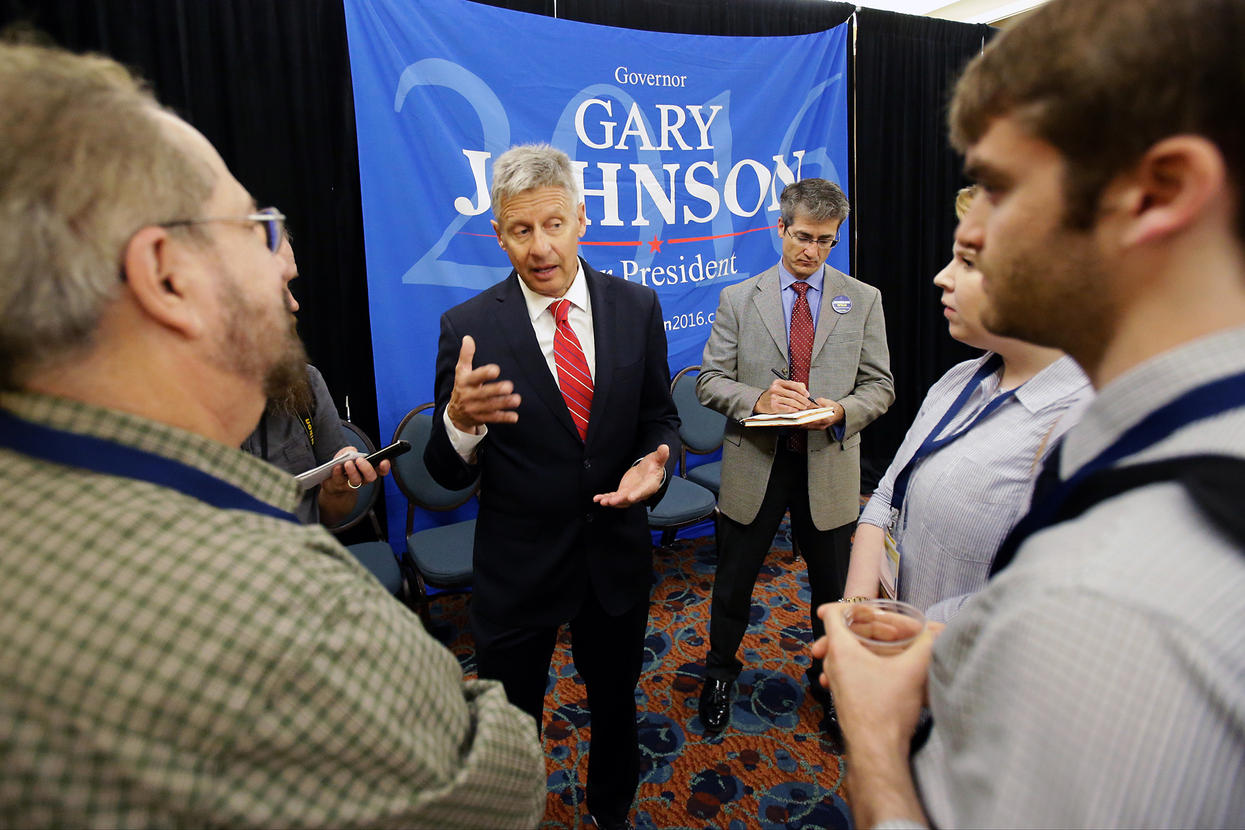Though Gary Johnson was unable to reach the 15% cutoff to make the debates this year, there is another important number his supporters are hoping he’ll achieve. By hitting 5%, Johnson will make the Libertarian Party (LP) eligible for public funding for the presidential campaign in 2020.
Many principled libertarians, however, are objecting to this, arguing that it would be hypocritical and un-libertarian for the party to accept a welfare check from the government.
Prima facie they seem to be correct. Upon deeper examination, however, the issue turns out to be much more complicated: there is justification for accepting the money under limited circumstances. Let’s dive in.
Is the Money Used for Public Funding Voluntary?

First, let’s get the facts straight. Many people believe that the money for the election fund is contributed voluntarily. Supposedly, taxpayers can choose to check a box on their tax form contributing an additional $3 to the Presidential Election Campaign Fund.
However, according to the FEC, this is not the case. The question on the tax form asks:
Do you want $3 of your federal tax to go to the Presidential Election Campaign Fund?
Yes
No
This means that taxpayers are allowed to allocate money they are already forced to pay to a specific area. The tax is still involuntary, but the payer gets to choose where it goes.
The FEC clarifies:
Does Checking “Yes” Increase My Tax?
Checking the “yes” box does not increase the amount of tax you owe, nor does it decrease any refund to which you are entitled.
In other words, this is not a voluntary payment, but a forced tax that a person chooses where to allocate. It’s like a robber taking $100 from you and then saying “Oh, but check this box, and I’ll donate $3 to charity.”
If it’s not voluntary, then case closed, right? Nope.
Is It Antithetical to Libertarianism to Use Stolen Money?

Consider an analogy: A gang steals from an innocent business owner. If a person, let’s call him Jones, performs a service for that gang, e.g. drives the getaway car, and gets a percentage of the money in return, then he participates in the crime, and is liable to be prosecuted.
In the analogy, the gang is the federal government, Jones is a government employee, and the business owner is the taxpayer. Like the driver of the getaway car, would the Libertarian Party be a participant in State theft (taxation) by accepting welfare?
While a government employee fits this analogy well, there needs to be some modifications if we’re going to talk about welfare. Going back to the example, let’s say that Jones wasn’t a car driver, but a poor sick person in a hospital bed. If the gang stole money from a business and gave a portion of it to Jones now, I don’t think any criminal court would prosecute him. Jones hasn’t directly assisted with theft, nor is he a part of the criminal organization in any real way.
Likewise, if the LP accepts welfare from the State, it’s not necessarily part of the criminal gang. It’s not like we’re doing the same work the IRS does nor are we remotely similar to an employee. At most, we’d be like Jones in the hospital bed. Therefore, accepting welfare isn’t inherently anti-libertarian, but there is some nuance.
For example, economist Robert Murphy brings up a good point regarding John Calhoun’s distinction between net tax payers and net tax consumers.
As Rothbard notes in Power and Market:
Calhoun saw that the binary intervention of taxation must always be spent so that some people in the community become net payers of tax funds, and the others net recipients. Calhoun defined the latter as the “ruling class” and the former as the “ruled.” (Man, Economy, and State with Power and Market, Scholar’s Edition, p. 881)
Why is this important? Because insofar as an individual or group is a net taxpayer, they are taking back money that is already theirs. Insofar as the individual or group is a net tax consumer, they are taking money that belongs to someone else.
How would this be calculated? That’s a tough question. The group that actually receives the benefit of the funding are the presidential campaigns of the candidates and nominees. So in calculating net taxes, there are two ways to regard the campaign: 1) as an institution that has paid taxes as part of its operations, or 2) as a set of individuals that make it up. The first way likely would not allow the campaign to take a significant amount of welfare. The second likely would, assuming that the majority of individuals are net tax payers. An even more charitable way to look at extra money would be to say they are “donations” of tax money from other Libertarians who support the party.
Whichever way we regard the campaign, as long as it is still a net taxpayer, it is not wrong to accept the welfare. Insofar as the campaign does that, it is only taking back its own money.
Fifth Column Activity

What if the party goes beyond that limit? Is it possible to look at the Libertarian Party as a fifth column actively undermining the State?
I think so, but I also believe this fits the bill for “anti-libertarian” actions. The most common example the anarcho-capitalist theorist Walter Block uses when discussing this is a man who joins the Nazis and tries to lower the death count. Rather than killing 100 people a day, he only kills 90 people and manages to save 10. Here, even though the man is against murder, he commits murder against 90 people daily.
Likewise, the libertarian who takes stolen money from the State, specifically stolen money that does not belong to him, is committing an anti-libertarian action. However, just like the community might pardon the man in the Nazi example if they believed him, the act we’re considering might be excusable as well, and perhaps even laudable. It is important that in this case the libertarian gets results. Otherwise he will have committed evil for nothing.
This is certainly more of a moral gray area. But when we do actually get candidates elected, unless they are to deny their wages, they are likely to be net tax consumers as well and fall under this heading.
Would the LP Still Be Hypocritical to Get a Welfare Check?

The Libertarian Party is in favor of lower spending and against welfare. So is it still hypocritical to accept money from the fund (even if it meets the conditions outlined above)?
First, a distinction: there is a difference between the existence of a program and its use by individuals and groups. As I have explained above, there is some justification for using the program while it exists, but I don’t believe that’s the case for the existence of the program itself.
For an analogy, consider private roads. Many libertarians are in favor of private roads and against the existence of public ones. Does it make them hypocritical if they use public roads in the meantime? Of course not. Most of us could hardly get out of our houses if this were the case. Actual hypocrisy would be if libertarians had a chance to privatize roads and chose not to.
Likewise, there’s nothing hypocritical about the Libertarian Party receiving federal funding, especially if it stays a net taxpayer. But it would be inconsistent not to end the program if the party ever got into power. Such welfare programs enrich an undeserved bureaucracy while funneling money around, even if it’s ultimately directed back at the person it belongs to.
Conclusion

If a thief steals your money and offers it back, there is nothing wrong with accepting it. But if a thief steals your money and the money of others, there is something wrong with taking back so much that you’re taking money that isn’t rightfully yours.
Now, I think a completely legitimate argument is that the LP accepting federal funding is bad for appearances, i.e. a bad marketing strategy. Even though it’s not hypocritical, it certainly looks that way.
Another important argument deals with the prohibitions on private funding that acceptance of federal funds involves.
Both of these are practical, strategic concerns and they should be considered strongly before any decision. However, from an ethical standpoint, it’s perfectly fine for the Libertarian Party to accept federal funds, as long as it stays a net taxpayer.
Follow Brett Chandrasekhar on Facebook.





3 comments
… [Trackback]
[…] Find More on to that Topic: thelibertarianrepublic.com/libertarian-party-public-funding/ […]
… [Trackback]
[…] Read More Info here to that Topic: thelibertarianrepublic.com/libertarian-party-public-funding/ […]
… [Trackback]
[…] Find More to that Topic: thelibertarianrepublic.com/libertarian-party-public-funding/ […]